Yes, SEO courses are worth it.
Particularly if you are a newcomer to the professional development field or aiming to broaden your skills in diverse areas. I’ve completed many SEO courses and can say free or paid for they’ve benefited my SEO skills.
Yet, is having a certification from an SEO course absolutely necessary to become an SEO specialist? No.
Enrolments and instructional classes are excellent for honing your foundational competencies and acclimatizing yourself to the SEO language and tools employed in the industry.
Search engine optimization (SEO) has become essential for anyone looking to succeed in digital marketing.
But how do you go about getting certified? This piece is a must-read because it highlights the practical benefits of SEO certification, such as staying current with best practices and improving campaign performance
So, is it worth doing a SEO Course?
Yes, getting certified in SEO can enhance your career growth and improve your SEO campaign’s return on investment.
Choose a certification program that aligns with your interests, career goals, and resources. Prepare adequately for the exam by reviewing the course material, taking practice tests, engaging with other learners, and exploring additional resources.
Is Google SEO course good?
Yes, it’s good to learn the basics from Google’s SEO course. It’s free and gives you the fundamentals.
Then, get stuck into more experience-driven courses from SEO tools, agencies, service providers, etc.
Benefits SEO Courses & Certification
Before delving into getting an SEO certification, it’s crucial to understand why it matters.
SEO optimizes digital content for search engines, making it more visible, relevant, and valuable to users. With more than 5 billion searches conducted daily, mastering SEO has become a critical component of digital marketing.
An SEO certification confirms that you possess the necessary knowledge and skills to execute effective SEO strategies, evaluate their performance, and help your company or clients succeed in their marketing efforts.
Getting certified in SEO brings numerous advantages to individuals and organizations:
It demonstrates that you have in-depth knowledge and skills in SEO, improving your credibility and value to potential employers or clients.
It helps you stay up-to-date with the latest best practices in SEO, ensuring that your skills remain relevant and practical.
It can help improve your SEO campaign’s performance, leading to better website traffic, visibility, and conversions.
The Rising Significance of SEO Skills
Moreover, having an SEO certification can open up new career opportunities in digital marketing.
According to a survey by Indeed, the average salary for an SEO specialist in the United States is $60,000 annually. With the demand for SEO professionals on the rise, having an SEO certification can give you a competitive edge in the job market.
At my SEO agency, a certification isn’t required if applying for a junior SEO specialist position, however, when we are recruiting for an SEO specialist, having certification and hands-on experience is strongly desired.
Popular SEO Certification Programs
Several organizations offer SEO certification programs. The following are some of the most widely recognized:
SEMrush SEO Certification
Semrush is a well-known SEO tool that offers an SEO certification program. The course covers keyword research, on-page optimization, link building, and analytics. Semrush provides tools to help SEO professionals improve their search engine rankings.
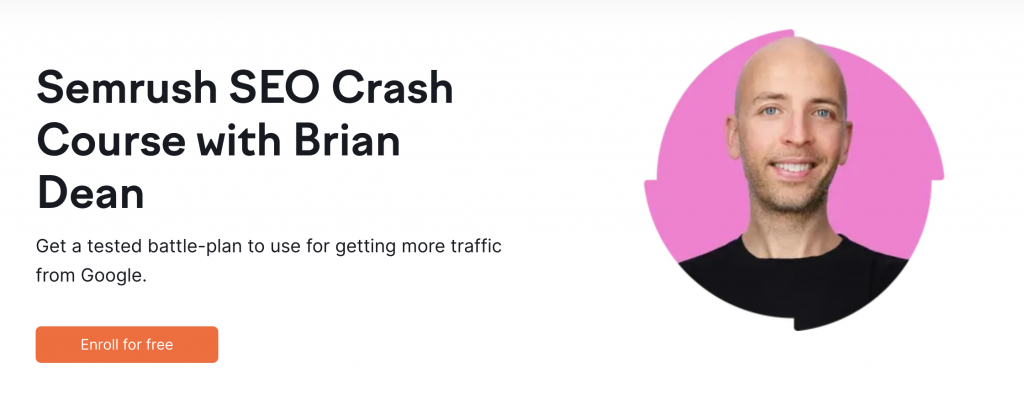
You must complete a series of video lessons and pass an exam to earn the certification. The course covers keyword research, on-page optimization, link building, and analytics. The exam has 40 questions; you have 60 minutes to complete it. Once you take free course and pass the exam, you will receive a certificate valid for two years.
Cost: Free
Content: Basics of how search engines work, link signals, technical SEO, on-page signals, international and local SEO.
Pros: Free, covers a wide range, taught by an expert, renowned company certification.
Cons: Less in-depth
Google SEO Fundamentals By UC Davis
UC Davis provide a free SEO course on Coursera it is an excellent way to learn about the basics of SEO and how it works. With a solid grasp of the fundamentals, you can begin to apply them in your daily work process and start seeing results.
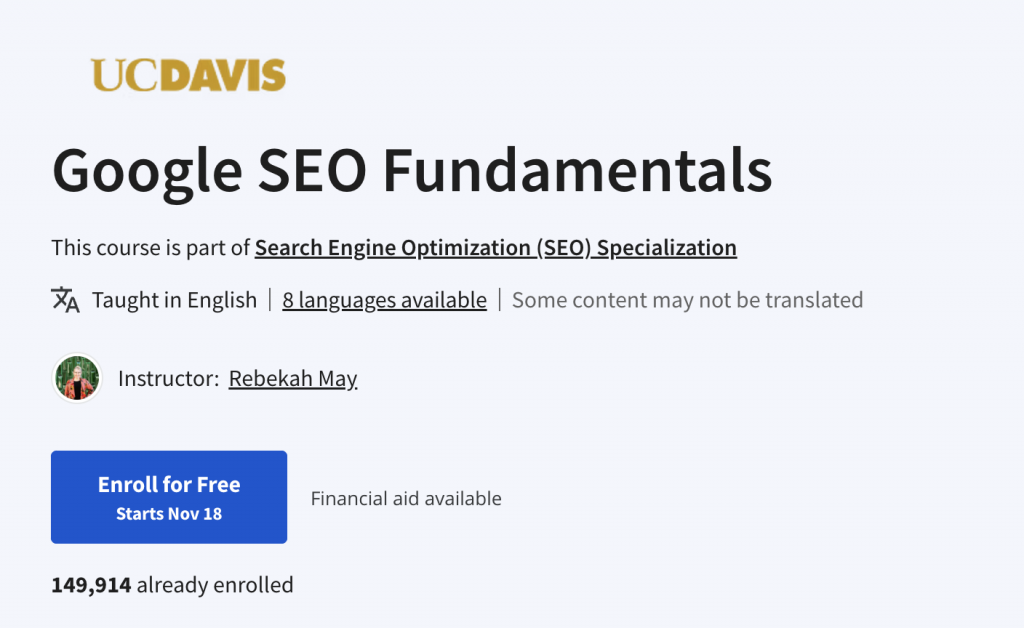
Cost: Free for 30 days; $59/month after
Content: Deep understanding of search engine algorithms, SEO strategy creation, keyword research, consumer psychology, on-page SEO, social media, marketing, mathematical optimization.
Pros: In-depth training, professional university lecturer, monthly charges, access to all Coursera classes.
Cons: Long course duration, doesn’t cover link building or technical SEO
Moz Academy SEO Certification
The Moz Academy offers a range of SEO certification courses, including beginner and advanced SEO programs, local SEO, and keyword research. Each class includes videos, case studies, quizzes, and an exam. Moz is a well-known SEO tool that provides tools to help SEO professionals improve their search engine rankings.

Cost: $595
Content: Fundamental SEO concepts, keyword research, on-page optimization, link building, tracking, and reporting SEO metrics.
Pros: Hands-on practice, no subscription needed, recognized brand.
Cons: Focuses on Moz Pro, no technical SEO
The beginner program covers the fundamentals of SEO, including keyword research, on-page optimization, and link building. The advanced program covers more advanced topics such as technical SEO, site architecture, and international SEO. The local SEO program covers topics such as local listings and reviews, while the keyword research program covers keyword research tools and techniques.
Yoast SEO Academy Certification
Yoast is a popular WordPress SEO plugin offering an SEO certification program. The course covers content marketing, SEO, technical SEO, eCommerce SEO, and local SEO. Yoast provides tools to help SEO professionals improve their search engine rankings.
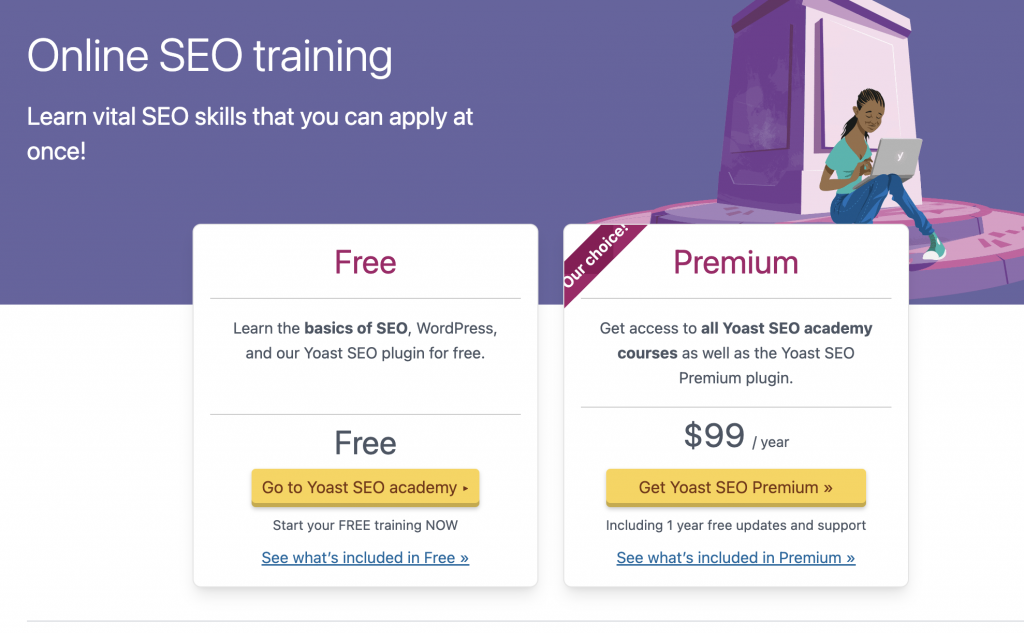
Cost: $99 per year
Content: Keyword research, SEO-friendly writing, site structure improvement, technical SEO strategies, off-page SEO tactics like link building, UX, email marketing, social media.
Pros: Affordable, covers main SEO topics, easy navigation.
Cons: Only three hours of videos, basic level
HubSpot SEO Certification
HubSpot offers a range of certifications, including an SEO certification, which covers topics such as keyword research, content optimization, link building, and analytics. HubSpot provides tools to help SEO professionals improve their search engine rankings.
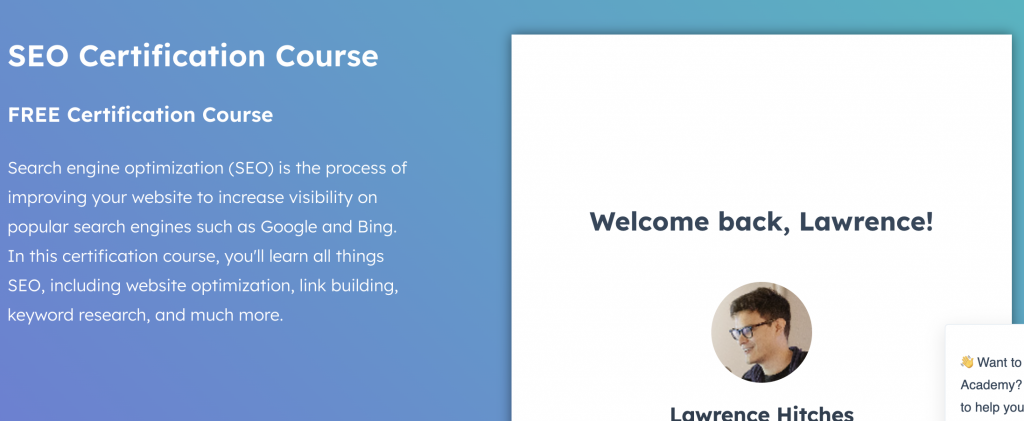
Cost: Free
Content: Site SEO evaluation, backlink building, data usage for site performance improvement.
Pros: User-friendly, free, reputable brand certification, personalized training.
Cons: Less comprehensive
Google Analytics 4 Certification from Google
Struggling with Google Analytics 4? Good news: Google’s got a course to make you a pro at it. SEO’s are having to skill up fast with this change from UA recently.
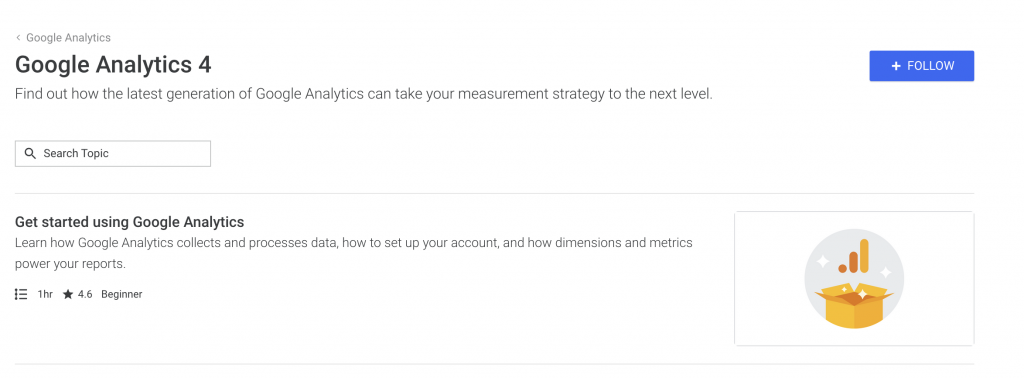
In just five parts, you’ll learn to gather, understand, and use data in Google Analytics 4. Plus, you’ll earn a certificate when you’re done.
The course has over 4 hours of videos and a 1.3-hour test for the certificate. Google tracks your progress, so you can learn at your own pace. By the end, you’ll be really good at using GA4.
Cost: Free
Content: Acquiring, analyzing, and acting on data in Google Analytics 4.
Pros: Free, comprehensive curriculum, provided by software creators.
Cons: Time-consuming, focuses only on analytics
How To Choose The Right SEO Certification Course Program
here are lots of courses you can take to learn more about SEO and get a certificate, but it can be hard to know which one to choose. Here are some tips:
Know Your SEO Level
First, think about how much you already know about SEO. If you’re just starting, look for beginner courses. If you know a lot already, look for advanced courses. This helps you pick a course that’s right for your skills.
Look at What the Course Offers
Different courses teach different things in different ways. Some might have videos, others might have live classes or projects you can do. Pick a course that teaches what you need to know in a way you like learning.
Check Who’s Offering the Course
It’s good to take a course from a well-known and respected place. This makes your certificate more valuable. Look at reviews or see if they work with well-known companies.
Think About Cost and Time
Some courses might be expensive or take a lot of time. Think about how much money and time you can spend on this course. Pick one that fits your budget and schedule.
So, choosing the right SEO course means thinking about what you already know, what you need to learn, who’s teaching the course, and how much time and money you can spend. Picking the right course can really help you get better at SEO and be more successful in your work.
Preparing For Your SEO Certification Exam
Reviewing The Course Material
One of the critical steps in preparing for your SEO certification exam is reviewing the course material thoroughly. Review the video lessons, texts, and quizzes to refresh your memory and reinforce your understanding of the concepts.
Taking Practice Exams
Consider taking practice exams to prepare for the actual test. Practice tests can help you identify your knowledge gaps and weaknesses and improve your test-taking skills.
Joining Study Groups Or Online Forums
Joining study groups or online forums can help you connect with other SEO practitioners and get new insights on SEO. Take advantage of such platforms to ask questions and engage with other learners such as Traffic Think Tank on Slack, or SEO Signal Labs on Facebook.
Utilizing Additional SEO Resources
Lastly, utilize additional SEO resources such as blogs, articles, and podcasts to broaden your knowledge of SEO. Stay updated with the latest SEO trends, tools, and techniques to stay ahead of the curve.
Sign Up to an SEO Certification!
Now you’re fully prepared to sign up to your next SEO certification as you’ve learnt about if it’s worth it, the benefits, the courses available, how to choose one, and how to nail them.


